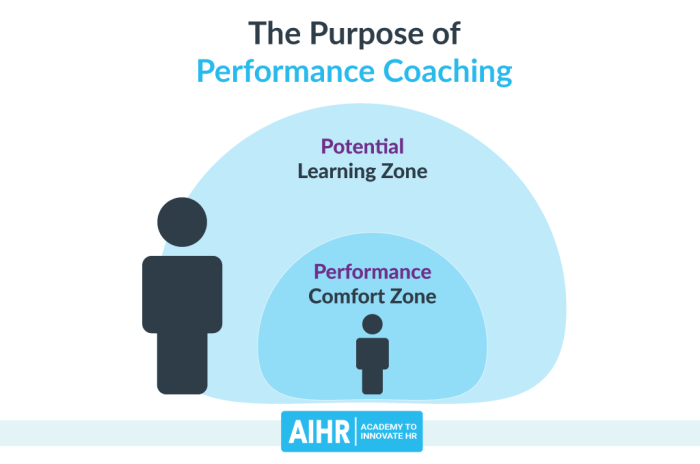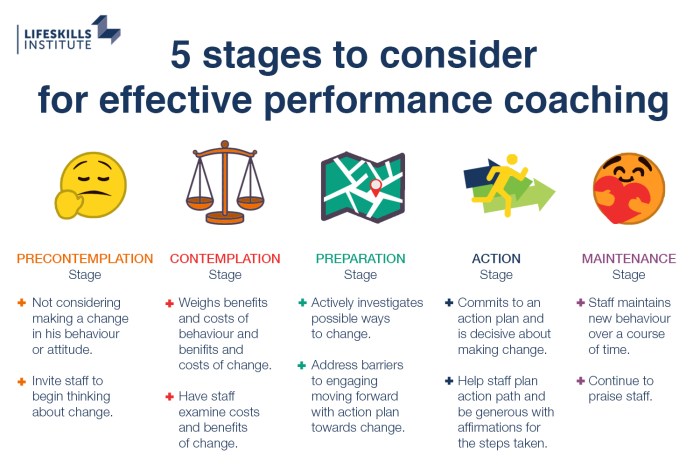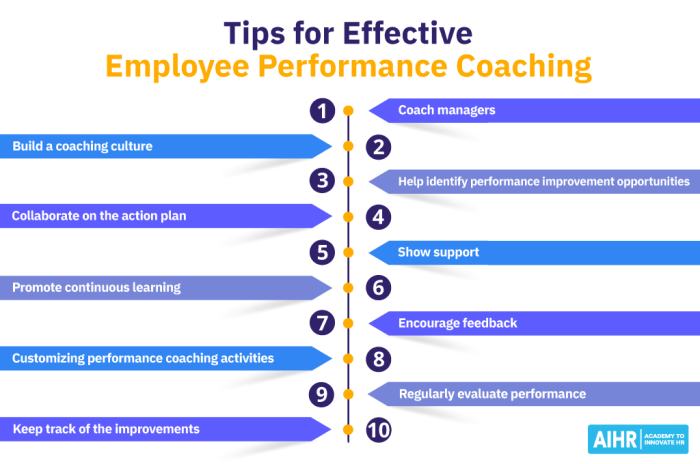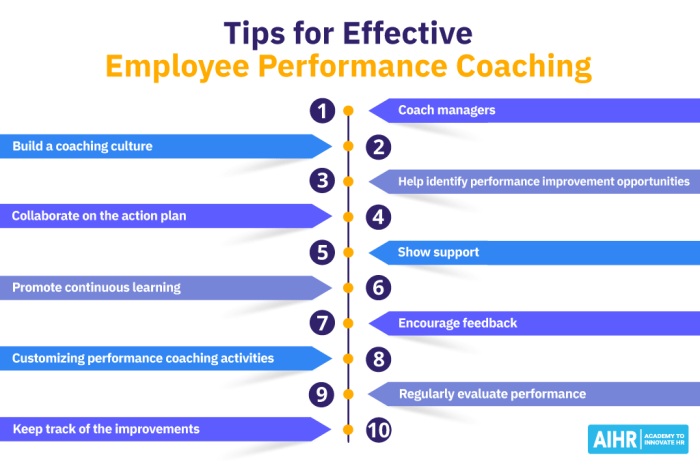Performance Coaches are everywhere these days, helping everyone from CEOs to college athletes crush their goals. They’re not just mentors or consultants; they use specific techniques to unlock potential and drive results. This deep dive explores the world of performance coaching, from its core principles to its exciting future, examining different styles, methods, and the impact of technology.
We’ll cover everything from identifying the right KPIs to measure success to understanding the ethical considerations involved in helping people reach their peak performance. Think of it as your ultimate guide to understanding how performance coaches help individuals and organizations achieve extraordinary things.
Defining Performance Coaching

Performance coaching is a collaborative process designed to unlock an individual’s or team’s potential to achieve exceptional results. It focuses on identifying strengths, addressing weaknesses, and developing strategies for improvement. Unlike therapy, which addresses emotional well-being, performance coaching is goal-oriented and future-focused, aiming to enhance performance in a specific area.Performance coaching operates on several core principles. It emphasizes a strengths-based approach, building upon existing capabilities rather than solely concentrating on deficits.
It also prioritizes self-discovery and autonomy, empowering the coachee to take ownership of their development. Accountability and measurable goals are crucial; progress is tracked and adjustments are made as needed. Finally, a strong coach-client relationship built on trust and open communication is essential for success.
Types of Performance Coaching
Performance coaching is applied across various fields, leading to distinct specializations. The approach and techniques may vary depending on the context, but the core principles remain consistent.
- Executive Coaching: This focuses on developing leadership skills, improving decision-making, and enhancing strategic thinking for senior-level executives. It often involves addressing challenges related to organizational leadership, change management, and team dynamics. For example, an executive coach might help a CEO improve their communication style to better engage employees or develop a strategic plan for navigating a period of rapid growth.
- Sports Coaching: This type of coaching centers on improving athletic performance, focusing on technique, physical conditioning, mental resilience, and strategic game planning. A sports coach might work with a professional athlete to refine their technique, improve their mental focus under pressure, or develop a customized training regimen to optimize their physical capabilities. Examples include working with a golfer to improve their putting technique or helping a basketball player enhance their free throw accuracy.
- Life Coaching: This broader category addresses various aspects of personal and professional life, helping individuals identify and achieve their goals in areas such as career, relationships, health, and well-being. A life coach might assist someone in overcoming procrastination to complete a long-delayed project or guide someone through a career transition. For instance, a life coach could help someone define their personal values and align their career with those values.
Performance Coaching vs. Mentoring and Consulting
While there’s overlap, key differences exist between performance coaching, mentoring, and consulting. Understanding these distinctions is crucial for choosing the right approach.
| Feature | Performance Coaching | Mentoring | Consulting |
|---|---|---|---|
| Focus | Goal achievement and skill development | Guidance and wisdom sharing based on experience | Problem-solving and providing expert advice |
| Relationship | Collaborative and equal partnership | Hierarchical, often with a power differential | Expert-client, often transactional |
| Process | Structured, goal-oriented, and measurable | Less structured, more organic | Project-based, focused on specific deliverables |
| Outcome | Enhanced performance and self-sufficiency | Personal and professional growth | Improved efficiency and effectiveness |
Examples of Successful Performance Coaching Interventions
Successful interventions often involve a tailored approach addressing specific needs. For instance, a sales team struggling with closing deals might benefit from coaching focusing on communication skills, negotiation tactics, and overcoming objections. A manager facing burnout might receive coaching centered on stress management, time management, and work-life balance strategies. A high-potential employee lacking leadership skills could benefit from executive coaching focusing on delegation, communication, and conflict resolution.
In each case, the coach works with the individual to define clear goals, develop actionable strategies, and track progress toward achieving desired outcomes.
The Role of a Performance Coach

Performance coaches are essentially partners in progress, guiding individuals and teams toward achieving their peak potential. They’re not just motivators; they’re strategic thinkers, skilled listeners, and expert facilitators who help clients identify their strengths, overcome obstacles, and develop actionable plans for success. Their role extends beyond simply offering advice; it involves creating a collaborative environment where clients can explore their goals, gain self-awareness, and build sustainable strategies for long-term growth.
Key Responsibilities of a Performance Coach
The core responsibilities of a performance coach center around building a strong client-coach relationship and facilitating meaningful change. This involves active listening, providing constructive feedback, and collaborating on goal setting and action planning. Coaches also act as accountability partners, checking in with clients regularly to monitor progress and offer support. Furthermore, they may employ various coaching methodologies and tools tailored to the client’s needs and goals, ensuring a personalized and effective approach.
Finally, they continuously evaluate their coaching methods and adapt their strategies as needed to maximize client success.
Essential Skills and Qualities of an Effective Performance Coach
Effective performance coaching demands a unique blend of hard and soft skills. Crucially, a strong foundation in active listening and empathetic communication is paramount. Coaches need to be adept at building rapport, creating a safe space for vulnerability, and fostering trust. Beyond interpersonal skills, strong analytical and problem-solving abilities are essential for identifying limiting beliefs, developing effective strategies, and tracking progress.
Furthermore, organizational skills and the ability to manage time effectively are vital for managing multiple clients and projects simultaneously. Finally, a commitment to continuous learning and professional development ensures coaches remain up-to-date with the latest methodologies and best practices.
Ethical Considerations for Performance Coaches
Maintaining ethical standards is paramount in performance coaching. Confidentiality is a cornerstone of the coach-client relationship, and coaches must uphold the strictest standards of privacy. Avoiding conflicts of interest is another crucial aspect, ensuring that the coach’s own personal interests do not compromise the client’s best interests. Maintaining professional boundaries is essential, ensuring that the relationship remains strictly professional and avoids any potential for exploitation or abuse.
Furthermore, coaches must be transparent about their qualifications and experience, avoiding any misleading or deceptive practices. Finally, acting with integrity and adhering to a strong code of ethics builds trust and ensures the integrity of the coaching profession.
Common Challenges Faced by Performance Coaches
Performance coaches frequently encounter various challenges. One common hurdle is managing client resistance to change. Clients may be hesitant to embrace new approaches or uncomfortable confronting underlying issues. Another challenge is dealing with clients who lack self-awareness or struggle to identify their goals. Additionally, coaches may face difficulties in motivating clients who are struggling with procrastination or lack of commitment.
Finally, maintaining a healthy work-life balance can be challenging, given the demands of managing multiple clients and ongoing professional development. Successfully navigating these challenges often requires adaptability, resilience, and a strong commitment to the client’s success.
Performance Coaching Methods and Techniques

Performance coaching isn’t a one-size-fits-all approach. Effective coaches utilize a variety of methods and techniques tailored to the individual client and their specific goals. Understanding these different approaches is crucial for achieving optimal results. This section will explore common methodologies and coaching styles, along with practical applications.
Common Performance Coaching Methodologies
A diverse range of methodologies exist to guide the coaching process. Selecting the right approach depends heavily on the client’s needs, the context of the coaching engagement, and the coach’s expertise. Here are some widely used methods:
- Goal Setting and Action Planning: This foundational method involves collaboratively defining clear, measurable, achievable, relevant, and time-bound (SMART) goals, then developing a structured plan to achieve them.
- Strengths-Based Coaching: This approach focuses on identifying and leveraging a client’s existing strengths to overcome challenges and achieve their goals. It emphasizes positive psychology and building on what the client already excels at.
- Cognitive Behavioral Coaching (CBC): CBC helps clients identify and modify negative thought patterns and behaviors that hinder their performance. It uses techniques like cognitive restructuring and behavioral experiments to promote positive change.
- Neuro-Linguistic Programming (NLP): NLP uses techniques to understand and influence communication patterns and mental models. It helps clients reframe limiting beliefs and develop more effective communication skills.
- Solution-Focused Brief Therapy (SFBT): This approach emphasizes finding solutions rather than dwelling on problems. It focuses on the client’s resources and strengths to achieve desired outcomes quickly and efficiently.
Comparison of Coaching Styles
Different coaching styles emphasize different aspects of the coaching relationship and process. Understanding these distinctions is important for selecting the most appropriate approach for a given situation.
| Style Name | Description | Strengths | Weaknesses |
|---|---|---|---|
| Transformational Coaching | Focuses on long-term personal and professional growth, empowering clients to discover their full potential and make significant life changes. | Promotes deep self-awareness and lasting change; highly motivating. | Can be time-consuming and requires a strong coach-client relationship; may not be suitable for all clients or situations. |
| Transactional Coaching | Focuses on achieving specific, measurable goals within a defined timeframe. Emphasizes accountability and results. | Highly effective for achieving short-term goals; results-oriented and efficient. | May lack the depth of transformational coaching; can feel less personal and less focused on long-term development. |
| Appreciative Inquiry | Focuses on building on existing strengths and positive experiences to create a desired future. It is collaborative and future-oriented. | Highly positive and empowering; builds strong relationships and motivation. | May not be effective for addressing deeply rooted problems or negative behaviors. |
| Mindfulness-Based Coaching | Integrates mindfulness practices to enhance self-awareness, emotional regulation, and stress management. | Promotes self-regulation and resilience; helps clients manage stress and improve focus. | Requires client commitment to mindfulness practices; may not be suitable for clients who are resistant to self-reflection. |
Applying Active Listening Techniques
Active listening is fundamental to effective coaching. It involves fully concentrating on what the client is saying, both verbally and nonverbally, and providing feedback to show understanding. This includes:
- Paying attention: Minimize distractions and focus solely on the client. Observe their body language and tone of voice.
- Withholding judgment: Listen without interrupting or formulating your response while the client is speaking.
- Reflecting: Paraphrase and summarize the client’s statements to ensure understanding. For example, “So, it sounds like you’re feeling frustrated because…”
- Clarifying: Ask open-ended questions to gain a deeper understanding of the client’s perspective. For instance, “Can you tell me more about that?”
- Summarizing: Periodically summarize key points to ensure you’re both on the same page. This helps to synthesize information and track progress.
Sample Coaching Session Plan, Performance Coaches
A structured session plan ensures a productive and focused coaching experience. Here’s an example:
- Opening (5 minutes): Establish rapport, review the agenda, and set the tone for the session.
- Goal Review (10 minutes): Review progress towards goals from the previous session, celebrating successes and addressing challenges.
- Exploration (20 minutes): Use active listening and open-ended questions to explore the client’s current situation, challenges, and opportunities. This is where the chosen coaching methodology will be applied.
- Action Planning (15 minutes): Collaboratively develop specific, measurable, achievable, relevant, and time-bound (SMART) actions for the client to take before the next session.
- Closing (10 minutes): Summarize key takeaways, schedule the next session, and provide encouragement and support.
Measuring the Effectiveness of Performance Coaching: Performance Coaches

Measuring the success of performance coaching isn’t just about feeling good; it’s about demonstrating tangible results. It requires a strategic approach, focusing on concrete metrics and consistent feedback loops to ensure the coaching investment yields a strong return. This involves clearly defined goals, appropriate measurement tools, and a systematic process for analyzing the data collected.
Effective measurement provides valuable insights, allowing coaches to refine their techniques, adapt to individual client needs, and ultimately, achieve better outcomes. It also strengthens the coach-client relationship by demonstrating a commitment to progress and accountability. Furthermore, demonstrating quantifiable results is crucial for justifying the investment in performance coaching, both for the individual client and the organization sponsoring the coaching.
Key Performance Indicators (KPIs) for Measuring Coaching Success
Choosing the right KPIs is crucial. These metrics should directly reflect the goals established at the beginning of the coaching engagement. They need to be specific, measurable, achievable, relevant, and time-bound (SMART). For example, if the goal is improved leadership skills, KPIs might include increased employee satisfaction scores, a reduction in team conflict, or the successful completion of a specific project.
For sales professionals, increased sales figures, improved conversion rates, or the acquisition of new clients could serve as effective KPIs. For executives, KPIs could focus on strategic goal attainment, improved team performance, or increased profitability.
Tools and Methods for Evaluating Coaching Outcomes
Several tools can help evaluate coaching outcomes. Pre- and post-coaching assessments, using standardized questionnaires or surveys, can measure changes in knowledge, skills, and attitudes. 360-degree feedback provides a holistic view of performance, incorporating input from peers, supervisors, and subordinates. Performance reviews can track progress against pre-defined goals. Client journals or reflective logs provide valuable qualitative data on the client’s self-perceived progress and challenges.
Finally, observations of client behavior in real-world settings, such as team meetings or client presentations, can offer additional insights into the effectiveness of the coaching intervention.
Setting Clear Goals and Expectations in Coaching Engagements
Before any coaching begins, clear, measurable, and achievable goals are essential. These goals should be collaboratively defined by both the coach and the client, ensuring alignment and buy-in. Specific targets, timelines, and success criteria should be documented. For instance, instead of a vague goal like “improve communication skills,” a SMART goal might be: “Improve communication skills by delivering three effective presentations to senior management by the end of the quarter, as measured by positive feedback from at least two senior managers.” This level of specificity makes measuring progress much easier and more objective.
Gathering and Analyzing Feedback from Coaching Clients
Regular feedback is vital. This can be gathered through informal conversations, formal surveys, and post-session debriefings. Feedback should be both qualitative (e.g., client reflections on their experience and progress) and quantitative (e.g., scores on assessments). Analyzing this feedback helps identify areas of strength and areas needing improvement in the coaching process. For example, if a client consistently mentions difficulty applying a specific technique, the coach can adjust their approach or provide additional support in that area.
The feedback loop ensures that the coaching process remains dynamic and responsive to the client’s evolving needs.
FAQs
How much does a performance coach cost?
Pricing varies wildly depending on experience, specialization, and the length of the engagement. Expect to pay anywhere from a few hundred to several thousand dollars per session or per month.
How do I find a good performance coach?
Look for coaches with relevant certifications, experience in your specific area, and positive client testimonials. Schedule consultations to see if their coaching style aligns with your needs and personality.
Is performance coaching right for me?
If you’re feeling stuck, want to achieve a specific goal, or need help navigating a challenging situation, performance coaching could be beneficial. It’s a great option for those who are self-motivated but need guidance and accountability.
What’s the difference between a life coach and a performance coach?
While there’s overlap, performance coaches often focus on specific, measurable goals related to work or athletic performance, while life coaches take a broader approach to personal well-being and life transitions.
